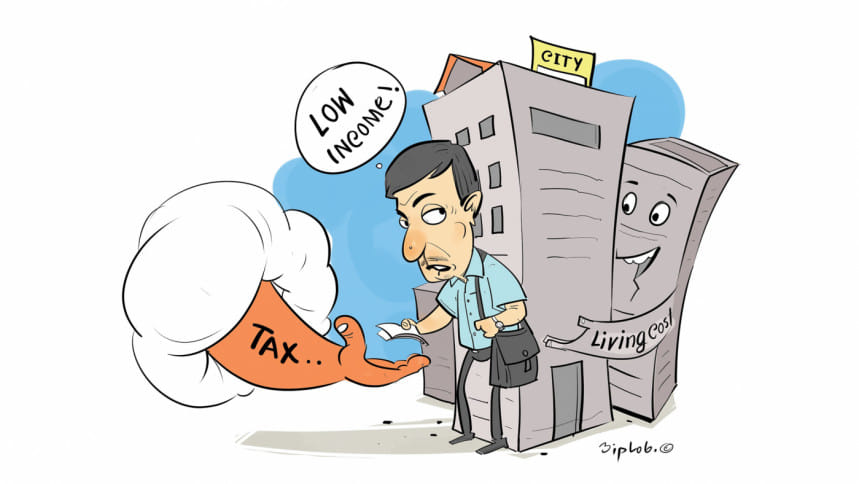Should tax-free income limit rise as inflation bites?

Mohammad Firoz works at a garment accessories manufacturing company and earns Tk 29,000 per month.
Last month, his five-member family was forced to move to a tin-shade room from a small flat in the capital's Mirpur as Firoz is failing to maintain the family expenses since the cost of living shows no sign of going down.
He has divided the room, which is large, with a board: he, his wife and their two school-going children live in one part of the room while his mother stays in the other part.
"My income is not enough to meet the tuition fees of the two children, afford the medicines for my mother, pay the house rent, and buy food. I have no way to earn more money," said Firoz.
He is one of the hundreds of thousands of fixed and low-salaried people in Bangladesh who are facing the same struggle because their monthly salary of Tk 25,000 to Tk 30,000 can't cover the expenditures since inflation has stayed at a higher level for nearly a year.
But the irony is if their monthly income crosses Tk 25,000, they are bound to pay income taxes as the tax-free income limit is Tk 3 lakh.
Both fixed and low-income people and analysts have described the income tax slapped on the earnings of Tk 25,000 as harsh amid higher consumer prices.
In most cases, employers deduct the tax from an employee's salary every month and deposit it in the government coffer.
"How can the government impose the income tax on such a low level of salary?" asked Firoz.
The tax-free income threshold should be raised to Tk 3.50 lakh considering the added pressure stemming from the rise in commodity prices, particularly those of food items, said Towfiqul Islam Khan, a senior research fellow of the Centre for Policy Dialogue (CPD).
The private think-tank calculated that a household of four persons residing in the Dhaka city needs Tk 23,676 a month to a make a decent living.
The second slab for personal income tax that is 5 per cent for the additional Tk 1 lakh should be increased to Tk 3 lakh to provide a cushion to limited-income earners, said Khan.
The government has maintained the tax-free income limit at Tk 3 lakh since the fiscal year of 2020-21 although the cost of living has gone up significantly since then.
At the same time, the highest tax rate was reduced from 30 per cent to 25 per cent, a move that goes against the cause of promoting tax justice, according to a number of analysts.
"The inflation rate is really high in Bangladesh, so it is tough to run a family with a monthly salary of Tk 25,000 to 30,000. So, the tax-free income limit should be readjusted," said Mohammad Abdur Razzaque, chairman of the Research and Policy Integration for Development.
"If the limit is raised, it will not impact the government's revenue generation to a large extent since this group of taxpayers pays a low amount of taxes."
The economist urged the National Board of Revenue (NBR) to expand the tax net by bringing the people who are not showing their income properly under the tax system.
Inflation in Bangladesh climbed 8.78 per cent in February, breaking a five-month declining trend. It surged to a 10-year high of 9.52 per cent in August, driven by higher commodity prices in the global markets owing to the Russian-Ukraine war. This has eroded the buying capacity of the people.
In order to protect their citizens from the ongoing cost-of-living crisis, many countries have taken tax measures.
In India, for example, the basic tax exemption limit has been hiked to 3 lakh rupees from 2.5 lakh rupees for the financial year beginning on April 1, 2023.
Ahsan H Mansur, executive director of the Policy Research Institute, however, says the tax-free income level is higher in Bangladesh compared to the developed nations in terms of per capita income.
"So, I don't support raising the tax-free income level. Instead, people should pay direct tax even if they earn a lower amount. The mindset to pay tax should be developed."
Analysts say the misuse of the taxpayers' money is discouraging people to pay taxes, so the government should ensure accountability and transparency in guaranteeing the value for money.
When people see that their hard-earned money, paid in the form of tax, is misused and they don't get quality healthcare, education, and other services, they feel discouraged to pay taxes, according to Mansur.
"We should make the government accountable in utilising the taxpayers' money."
"We are talking to stakeholders now and they are also recommending raising the tax-free income level," said Sams Uddin Ahmed, member for tax policy at the NBR.
"The NBR will make a decision soon considering the present economic situation."

 For all latest news, follow The Daily Star's Google News channel.
For all latest news, follow The Daily Star's Google News channel. 







Comments